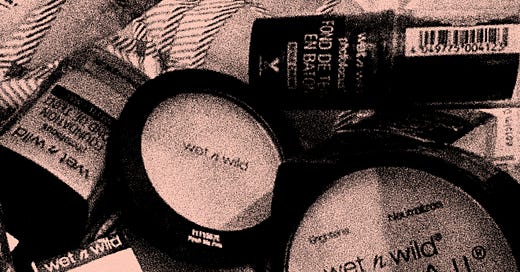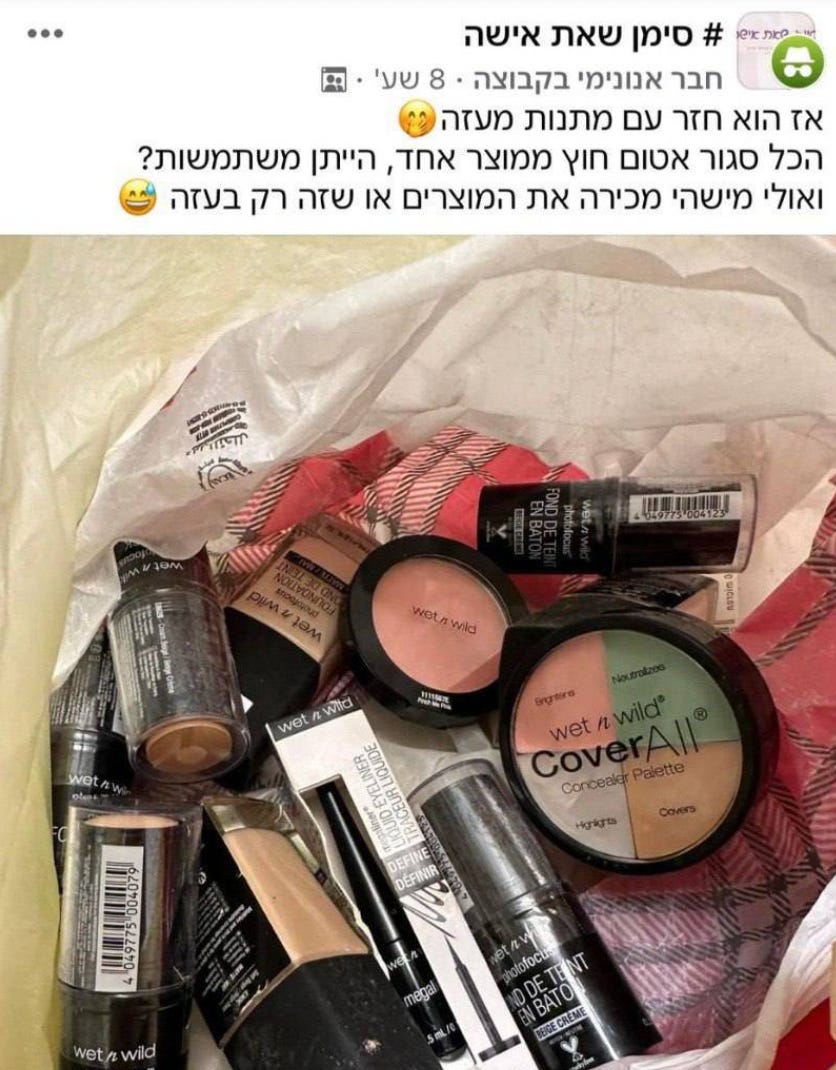If post-feminist feminism had a tagline it might be Beauty is a weapon or Beauty is political. It’s not that these statements are wrong, exactly. It’s that they’re (usually) wrong contextually — when deployed as excuses for buying a dual-action exfoliating cleanser or a tube of “cruelty-free” concealer, as an individual’s plea to be recognized as someone on the side of justice for all.
I don’t think the corrective to this is to ignore physical beauty and its tools, or to downplay their power, but to challenge ourselves to be more aware of beauty’s power in any given situation — who wields it, who it’s wielded against — and to direct it, whenever possible, toward projects of collective liberation.
This has been a motivating thought for me over the past six months, as images of starved children and razed hospitals and 33,000 dead bodies stream out of Gaza and I sit in the glow of my laptop screen researching… Botox? Beyoncé’s shampoo? I’ve felt useless, hopeless, unserious, scared of spending my life sending emails about skincare while others are losing theirs. In an effort to be less useless, I sought out local groups organizing against the genocide in Palestine. I attended a couple city council meetings urging local politicians to pass permanent ceasefire resolutions. At these meetings, attendees are encouraged to speak in favor of the proposed resolutions during public comments, and each citizen is allotted three minutes to address members of the council. The idea is to “focus on the human cost of the conflict and the importance of international pressure for peace” and “share personal stories or experiences to personalize the issue and connect.” At the first meeting, one person spoke about how Palestinian women don’t have access to menstrual products. Another read posts from queer Palestinians on Queering the Map. And I realized that beauty could be part of this, too — a personal story, a point of connection, a political tool. At the next council meeting, I spoke about the makeup bags IDF soldiers are reported to have looted from Gazan homes and the dehumanization it represents.
Below, I’m sharing my short speech in full. If you feel similarly devastated by the war in Gaza and, in the face of so much death, conflicted about the space beauty takes up in your life, consider the ways beauty can be political and know you can put that space to use.
Hi, my name is Jessica DeFino, and I’m here to ask you to pass the proposed ceasefire resolution.
For work, I write about the beauty industry. I write about how, for better or worse, people often use the tools of beauty to discover themselves, to present themselves, to tell the world, This is who I am and how I want to be seen. I am here. I am real. On occasion, I’ve even mentioned this town’s many, many beauty establishments. The blow dry bar, the waxing salon, the fitness studios, the spas, and, on weekends when the outdoor market is set up, the homemade skincare and soaps.
Being so immersed in the beauty space, there is one image from Gaza I can’t get out of my head. Pictures have surfaced of Israeli soldiers looting civilian homes in Palestine. They hold up lingerie that belonged to women who were forced out of their houses at best or killed at worst, and they smile for the camera. The soldiers sometimes bring the spoils back to their wives. One of them posted a snapshot of her stolen presents to social media, including a plastic bag overflowing with makeup — eyeshadow, eyeliner, blush, foundation, lipstick. She called the products “gifts from Gaza.”
It made me think of a scene from The Zone of Interest, a recent film about the Holocaust centered on Auschwitz commandant Rudolf Höss and his family. In the film, the commandant’s wife applies red lipstick looted from a Jewish home, admires herself in the mirror, smacks her lips. She later asks her husband to bring her more “goodies” from the Jewish women now living, and soon dying, in the concentration camps.
The movie asks us to consider the mundanity that masks the terror around us.
But the makeup from Gaza is not a prop in a movie, and it is not mundane. It is beyond defense. It is dehumanization — reducing a person to a product to a trophy. It is the obliteration of the Palestinian people — stealing not only their lives, but the tools they used to craft and care for and adorn those lives; killing not only their bodies, but the spirit infused in all the things that touched those bodies — like lipstick that once pressed against a mouth that breathed and ate and spoke and kissed and prayed and screamed.
This is genocide. It is erasure. It is delight in erasure. It is sick, it is a loss of humanity, it is a loss of soul. And to force American citizens who overwhelmingly support a ceasefire to be complicit in this is to force another kind of soul loss. We cannot allow this to become mundane. It must remain terrifying. We have to hold on to our souls, and grieve for the 33,000 Palestinians and 1,200 Israelis killed since October 7, and stand against genocide.
My taxes fund this crisis, and so I have a moral responsibility to urge you, as elected officials representing citizens calling for a permanent ceasefire, to pass the proposed resolution.
I’ve timed this talk — if you speak quickly, it’s just about three minutes. Feel free to use it, borrow from it, modify it however you need for your own city council meetings. Here is more information about introducing resolutions for a permanent ceasefire and humanitarian aid at the local level.
“Going to a city council is not only allowing you to hold someone in power accountable face to face, but it’s more likely to be efficient,” the organizer in my area explains. “If a representative hasn’t called for a ceasefire but a bunch of cities in their district have passed these resolutions, that would look awful for the representative. Things always take off from a smaller level — they don’t just automatically happen on a large scale. When communities all across the country are passing these resolutions, our hopes are that this will take off into something bigger.”






thank you for speaking up about palestine! i don't see many fashion & beauty writers on here discussing the current genocide. we should all be reading about these connections.
As a Jew, I am so so so so so grateful for your words. Thank you for sharing truth and connecting your expertise to the horrors and genocide happening in Gaza. Forever grateful for your work!